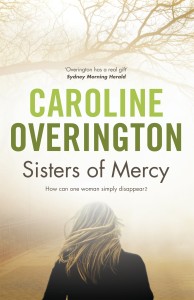This year I am again taking part in the Australian Women Writers Challenge. This means I am committing to reading six books by Australian female writers and reviewing at least four of them. The first cab off the rank is Sisters of Mercy by Caroline Overington.
 Two sisters, raised apart unaware they had a sibling, are reunited after their father’s death. Agnes had been raised in orphanages in England and Australia never knowing what had happened to her parents. Snow, born many years later to the same couple raised by them in an emotionally disconnected household.
Two sisters, raised apart unaware they had a sibling, are reunited after their father’s death. Agnes had been raised in orphanages in England and Australia never knowing what had happened to her parents. Snow, born many years later to the same couple raised by them in an emotionally disconnected household.
The mystery develops when Agnes travels to Australia to meet Snow and disappears. Has Snow murdered her sister? Or perhaps her creepy boyfriend has had something to do with it?
Caroline Overington is an accomplished journalist and author. Sisters of Mercy is her fourth novel.
The novel has a strong ring of authenticity in the narrator, journalist Jack Fawcett, who finds himself the recipient of Snow’s letters from prison, where she defends her innocence.
As we read along with Jack the character of Snow develops. It is quite gripping and as a reader I was one minute believing her innocent the next certain of her guilt. In the end it provides a fascinating psychological portrait of how an individual morphs and changes throughout time, circumstances and experiences, sometimes not for the better.
The characters of Agnes and her family are much less well-developed. A notion highlighted throughout the book is that Agnes, the child deserted and raised in orphanages emerges with an inbuilt optimism and confidence that her life had been good. In comparison Snow who won the golden ticket of a family ends up bitter and petulant. This idea seems a little disingenuous to me and it would have been good to have learnt more about Agnes and her experiences to strengthen this argument.
Sisters of Mercy, in an aside to the central story, does raise questions over the care of the disabled in our society. Snow is a nurse, who specialises in the care of the disabled, eventually taking many into foster care in her own home. The contrast of caring career versus murderer contributes to the confusion over Snow’s guilt or innocence. The eventual denouement of why Snow is in jail is shocking and adds greats strength to the narrative. The notion of truth and innocence jumbles as we read from Snow’s perspective in her letters side-by-side with Jack’s interpretations of events and his interviews with Agnes’ family.
Ultimately, I was engrossed in the story throughout but was left a little disappointed by the ending.





Leave a Reply